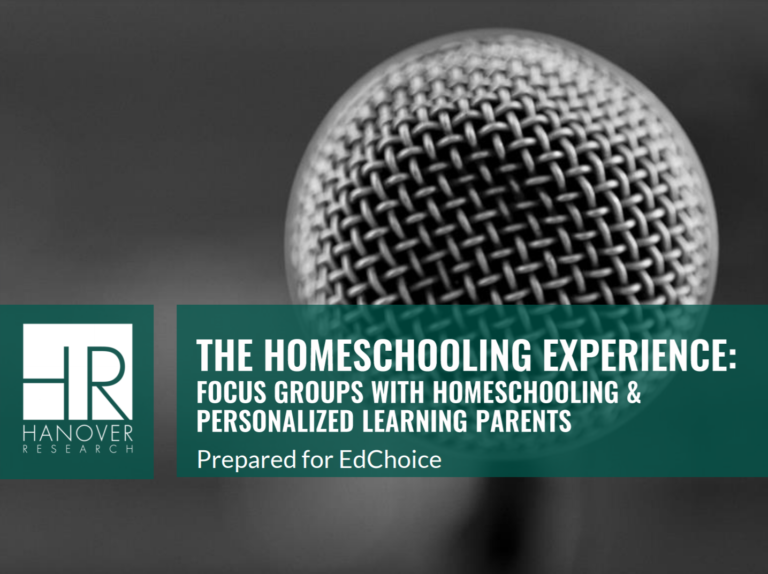Focus Group: Homeschooling Families on Personalized Learning
Earlier this month, we released the results of a large survey of homeschooling families. Respondents to that survey offered fascinating insights into the state of homeschooling in America circa early 2021. They told us (well, they told our partner Hanover Research) that they are homeschooling because of the coronavirus pandemic, to have more flexibility to shape their child’s learning, and to give their kids more one-on-one attention. They expressed fears about their children’s future prospects, worries about having enough time for both home and school life, and admitted a lack of knowledge about homeschooling functioning as an initial barrier. That said, they said that homeschooling had improved their relationship with their children, offered more time for other activities, and they believed that their children were learning more than in their previous educational environments.
Surveys can only tell us so much. To get as many people to participate as possible, surveys are designed to efficiently ask a large number of questions, usually using multiple choice-style prompts to allow us to gather a lot of information in a short amount of time. This can lead to a flattening of the contours and textures of what respondents really think.
To solve this problem, we included a question at the end of the survey to see if respondents would be interested in participating in longer-form focus groups to allow for a richer discussion of their homeschooling experience. To get into the survey in general, respondents had to agree with the statement that they had at least considered homeschooling at some point. That created a large population of homeschoolers and a large population of homeschool-curious respondents.
Working with Hanover Research, we conducted six focus groups of parents, three with homeschooling parents and three with non-homeschooling parents but who identified that they had in some way personalized their child’s learning over the last year.
So what did we find? The report is meaty, and worth taking some time to chew on and digest, but a couple of high-level points are worth highlighting:
Homeschooling requires a blend of flexibility and structure
One homeschooling parent of a kindergartener said this:
“I know what parts of the day are going to be better for sitting down and being interested and what times he’s tired. As they get older, your routines are going to have to go along with the age. Once we got into a routine, it was very, very important to stick to it, same thing every day, other than weekends. That way, he knows what’s expected, and it goes a lot smoother.”
Homeschooling parents are drawn to the practice because it allows them to develop routines and schedules that work for them. Students can learn at the times of the day when they are most engaged. Families can have time to do activities that they want to do. This is all great but requires some trial and error to figure out just how to make it happen. Children do not immediately know exactly when they work best. Parents still have to do some poking and prodding. The schedule will even out over time, but it takes adjusting. Parents recommended techniques like getting dressed in the morning to establish a routine, using timed intervals for tasks to establish structure, using incentives and consequences to manage child behavior, and controlling access to the refrigerator to curtail boredom snacking.
Homeschooling parents value social networks to support learning and socialization
A homeschooling parent of a fifth grader said this:
“We were part of a co-op group that met once a week. Different people taught different classes. They had somebody doing science class. We were part of that and socialized that way. It’s been a lot more difficult during pandemic. We still have some Zoom sessions.”
Homeschooling parents talked about co-ops and “pandemic pods” as sources of collaboration and community. We think about the needs of children to socialize with each other, but it is important to remember that parents need to socialize too. Co-ops allow for both. Homeschooling parents can get together, share their experiences, and strategize with each other, and children can learn and play with each other. Parents look to neighborhood groups on social media sites to find other homeschooling families and also use church and family networks to connect. Facebook, Nextdoor, and other similar sites became important during the pandemic.
The Pandemic was a personalized learning wakeup call
A parent of 8th and 9th grade students who turned to personalized learning during the pandemic said the following:
“I noticed it wouldn’t take my kids very long to do the lessons that the teacher made. They’re telling me out of their own mouth, ‘Mom, all the kids at school just guessed on it. We just guessed.’ That’s not learning. I knew that I needed to step in because they weren’t learning anything.”
Yikes. Unfortunately, this parent’s experiences were common over the course of the last year. Parents noticed declining grades, a loss of attention, and troubling developments in their children’s emotional states. The complicating factor was how different children, even in the same household, would need different things and would receive different support from their schools. Some parents were really wowed by how well their child’s teacher handled the pandemic and thought that they did an amazing job. Others were gobsmacked with just how little effort their child’s teacher put in. This meant that some parents needed to intervene severely with one of their children and not at all with another. Neuro-atypical students appeared to particularly struggle with virtual learning, and parents reported frustrations and meltdowns due to a lack of connection with their teachers and classmates online. This pushed parents to take more of their child’s education into their own hands.
Parents personalizing their children’s learning need community too
A personalized-learning parent of a first grader said this:
I reached out on Facebook because there’s a group for mothers that have children with autism. They were putting things on there that could help you, coping tactics because as parents you need help coping with everything that you’re not used to during the whole day.”
Parents were tossed into the deep end by the coronavirus pandemic. As many had a first window into what went on their child’s classroom via a Zoom screen on their kitchen table, they realized they had their work cut out for them. They had to scramble to find instructional materials (and if you dig into the report, there is a lot of interesting stuff in there from both homeschooling and personalized-learning parents about the types of resources that would help them), transition into a teaching role for their children for part of the day, and balance all of the other requirements of their lives. This was not easy. Parents needed support, and looked to family, friends, neighbors, co-workers, and just about anyone else that could give them advice and counsel. They reached out on social media and tried to create small communities in real life to work together and share their struggles. If personalized learning is going to continue, and parents are going to take a larger role in customizing their child’s learning, it is essential to provide social support for them. Parents need more than a curated set of approved providers or quality resources, they need other human beings to talk to and develop trusting and supportive relationships with to discuss the details of what they are doing and answer the questions that they have.
There is so much more in the report, which you can find here:
What stands out to you? Are there research questions about homeschooling or personalized learning that you have? Do you have experiences to share? We would love to hear from you.





